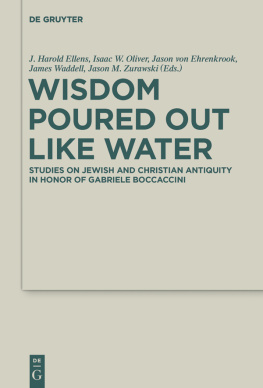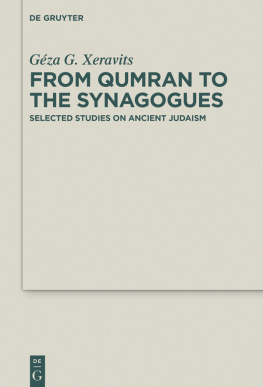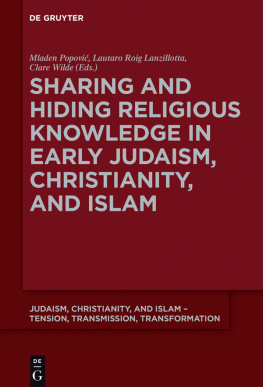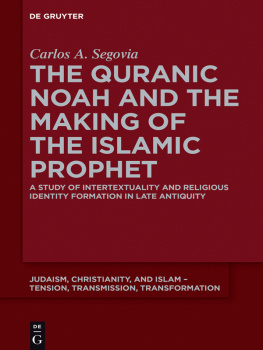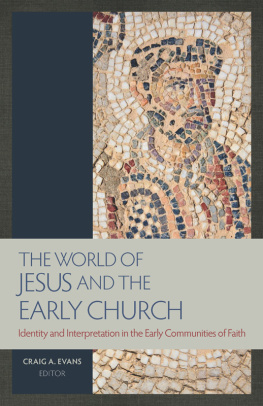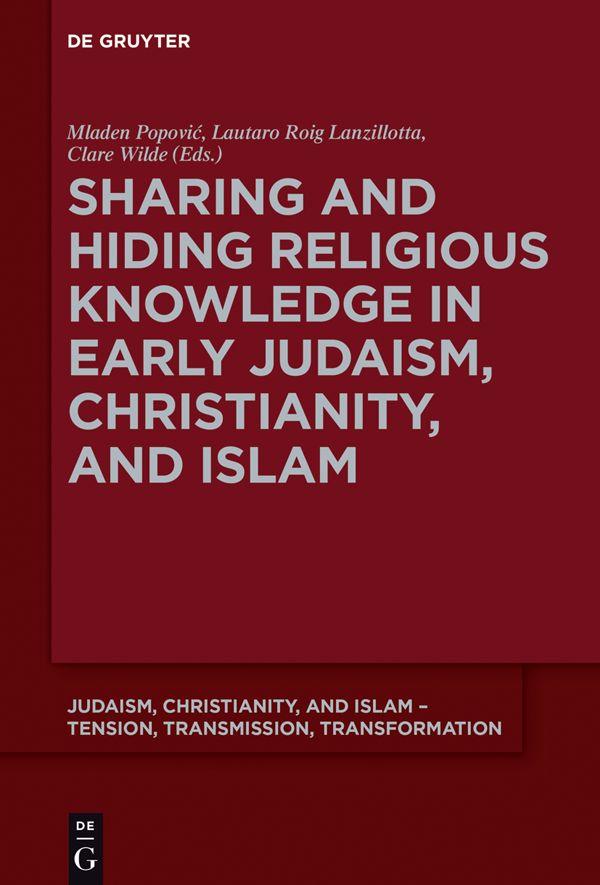
Sharing and Hiding Religious Knowledge in Early Judaism, Christianity, and Islam
Judaism, Christianity, and Islam Tension, Transmission, Transformation

Edited by
Patrice Brodeur, Alexandra Cuffel, Assaad Elias Kattan, and Georges Tamer
Volume 10
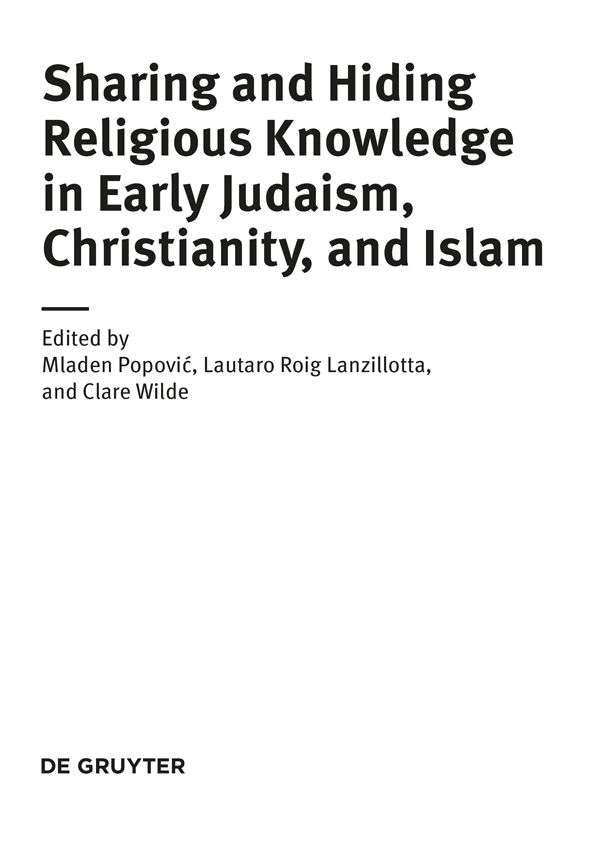
ISBN 978-3-11-059571-0
e-ISBN (PDF) 978-3-11-059660-1
e-ISBN (EPUB) 978-3-11-059366-2
ISSN 2196-405X
Library of Congress Control Number: 2018943762
Bibliographic information published by the Deutsche Nationalbibliothek
The Deutsche Nationalbibliothek lists this publication in the Deutsche Nationalbibliografie; detailed bibliographic data are available in the Internet at http://dnb.dnb.de.
2018 Walter de Gruyter GmbH, Berlin/Boston
www.degruyter.com
Acknowledgments
This collection of essays arises from the international conference on 2224 April 2015 organized by the Department of Jewish, Christian, and Islamic Origins at the Faculty of Theology and Religious Studies of the University of Groningen: Sharing and Hiding Religious Knowledge: Strategies of Acculturation and Cultural Resistance in Early Jewish, Christian, and Islamic Traditions. The organizers are very grateful to the Royal Netherlands Academy of Arts and Sciences and the Nicolaas Mulerius Fund (University of Groningen) for awarding the necessary grants that made the conference possible. The resulting essays have been thoroughly reworked for inclusion into this volume. We wish to thank the series editors of De Gruyter Publishers for accepting this volume for publication into their series Judaism, Christianity, and Islam Tension, Transmission, Transformation.
Contents
Mladen Popovi, Lautaro Roig Lanzillotta, and Clare Wilde
Eleanor Robson
Mladen Popovi
Jacques van Ruiten
Katell Berthelot
Delfim F. Leo
Lautaro Roig Lanzillotta
George van Kooten
Clare Wilde
Paul E. Walker
Mladen Popovi, Lautaro Roig Lanzillotta and Clare Wilde
Introduction
Sharing and Hiding Religious Knowledge in Early Jewish, Christian, and Islamic Traditions
Knowledge in Antiquity was cherished as a scarce good and its character and transmission tainted with an esoteric allure. The production and cultivation of knowledge not only took place within the limited circle of the initiated; its diffusion was also channelled through the close relationship teacher-disciple.
The esoteric aspect plays a central role in scholarly, scribal, religious and philosophical contexts. Knowledge was not only intended for a limited group of followers; it also seemed to provide a higher form of consciousness that not everyone was willing or able to bear. If from an existential perspective, knowledge provides individuals with a holistic framework to supersede a fragmented reality, from a social viewpoint, it provides them with the means to advance in the social hierarchy. On the one hand, possessing or lacking knowledge determines social status; on the other, sharing or hiding knowledge is used in strategies of inclusion and exclusion that are highly productive both at the micro (within religious communities themselves) and the macro levels (within multicultural societies at large).
Whether religious knowledge could or should be shared with others or, instead, kept to oneself was one of the central issues by which Jews, Christians, and Muslims defined themselves in relation to each other and the world around them. The formative stages of each of these traditions were characterised by a wide diversity of attitudes towards, and means of, knowledge sharing and hiding. Although this sharing and hiding could be textual, such as the Wisdom literature in the Hebrew Bible or the revelatory knowledge throughout Jewish tradition, this volume focuses on the cultural encounter between Jews, Babylonians, Greeks, Romans, and others. With whom was religious knowledge shared or from whom was it hidden?
Although the hiding of knowledge connotes an active strategy of concealment, it does not preclude the possibility of simply not sharing certain things. And the refusal to share aspects of religious knowledge may also illuminate the nature of specific cultural encounters. Is the transmission of knowledge geared toward internal consumption or is it shared with outsiders? With respect to Judaism, these questions have emerged in recent discussions about the position of rabbinic cultures within the Roman Empire: were they part of it or resistant to it? The sharing and hiding of knowledge also relates to processes of acculturation and cultural resistance. How, for example, should the cultural transfer of knowledge and multilingualism in bodies of learning that are seemingly culturally resistant, such as the Dead Sea Scrolls, be understood? How does this relate, from a comparative perspective, to the Epicurean library from Herculaneum, which belonged to Philodemus, a philosopher who came from nearby Gadara, but seemingly from an entirely different culture?
The tension between esoteric and open, namely between hiding and sharing knowledge, is at the core of the early Christian movement. While proto-orthodox Christians claimed an open and public notion of religious knowledge that was accessible to everyone, heterodox groups conceived it in esoteric terms, limiting it to a small group of initiates. Both Christian views of knowledge reflect divergent attitudes towards the cultural and religious domination of the Graeco-Roman society. On the one hand, the universalism of proto-orthodoxy overtly rejects the esoteric character of some late antique religious experience and might therefore be described as cultural resistance; on the other hand, heterodox perceptions of religious knowledge clearly show a continuity with the surrounding world. They thus provide a good example of acculturation, in which Christians accommodated to the cultural standards of the Graeco-Roman religious experience.
The quest for knowledge and learning is, according to a canonical adth, enjoined on every Muslim. The importance of knowledge and learning is also in the Qurn which states explicitly: Say: Are they equal those who know and those who know not? Only those with understanding will take the admonishment to heart (Qurn 39:9). The quest for and spread of knowledge and learning became one of the important characteristics of the emerging religion and civilization.
Two kinds of knowledge developed, both of which were based, to a certain degree, on the Qurn and Sunna. One focused on the apparent, manifest, exoteric sense; the other, its hidden, inner, esoteric sense. The former is exemplified by the caliph Uthmn sending copies of the vulgate text of the Qurn to the metropoles of the new empire. Even if this account is not historically reliable, it is at least symbolically true: it highlights the text-centric nature of religious learning in the Arab-Islamic civilisations. Whatever geographical centres of learning may have existed, the Qurn became the ideological centre of Islams religious learning, shaping many other kinds of learning as well, including the Arabic language itself. The mystical tradition, on the other hand, emphasised knowledge of the inner self, or internal knowledge, for which a long period of spiritual and physical exercises under the strict guidance of an adept teacher was nearly always needed.


